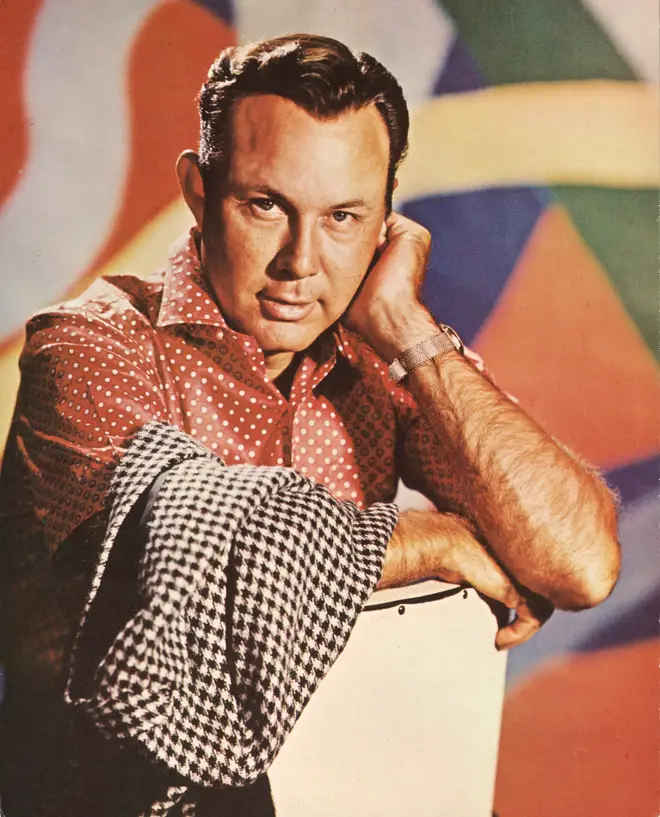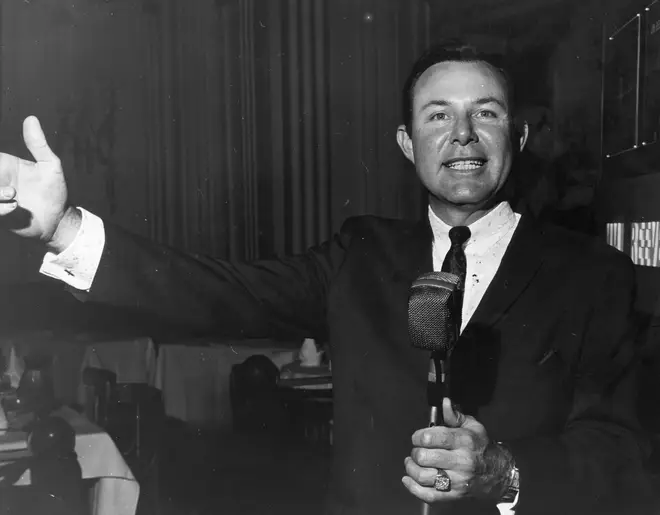Jim Reeves: The gentleman of country music who dominated the charts, and his tragic death remembered
23 October 2023, 11:23

Jim Reeves was one of the most influential and popular singers of country and pop music in the 1950s and 1960s.
Listen to this article
His smooth, warm voice and his refined style earned him the nickname 'Gentleman Jim'.
He was also a pioneer of the Nashville sound, a blend of traditional country music with elements of pop and orchestration. His songs crossed over to different genres and markets, reaching audiences in the USA, Britain, India, Scandinavia, South Africa and beyond.
He recorded dozens of hit songs, such as 'He'll Have to Go', 'Four Walls', 'Welcome to My World', 'I Love You Because' and 'Distant Drums'.
He also wrote some of his own songs, such as 'Bimbo', 'Mexican Joe' and 'Yonder Comes a Sucker'. He was a member of the Grand Ole Opry and the Country Music Hall of Fame.

He also starred in a movie, Kimberley Jim, and recorded songs in several languages, including Afrikaans, Norwegian and German.
Jim Reeves was born on August 20, 1923, in Galloway, Texas, a small rural community near Carthage. He was the youngest of eight children born to Thomas Middleton Reeves and Mary Beulah Adams Reeves. He was known as Travis during his childhood years.
Jim grew up in a poor farming family and learned to play guitar at an early age. He was also interested in sports, especially baseball. He won an athletic scholarship to the University of Texas, where he studied speech and drama for six weeks before dropping out to work in the shipyards in Houston during World War II.
He also played baseball for the semi-professional leagues and was signed by the St. Louis Cardinals farm team in 1944 as a right-handed pitcher. However, he injured his leg while pitching and had to end his athletic career.
Reeves then turned to music and radio as his new passions. He worked as a radio announcer and sang live between songs. He also performed at local clubs and honky-tonks, and was influenced by early country and western swing artists such as Jimmie Rodgers and Moon Mullican, as well as popular singers like Bing Crosby, Eddy Arnold and Frank Sinatra.

Jim Reeves - He'll Have To Go
He began his recording career in 1945 with small Texas-based labels, but without much success. In 1947, he married Mary White, who became his lifelong partner and manager. In 1952, he moved to Shreveport, Louisiana, where he joined the Louisiana Hayride radio show as an announcer and singer. He also met Hank Williams, who became his friend and mentor.
Reeves' breakthrough came in 1953 when he recorded 'Mexican Joe', a novelty song written by Mitchell Torok. The song became a number one hit on the country charts and launched Reeves' national fame. He followed it with another number one hit, 'Bimbo', which he wrote himself.
He also signed with RCA Victor, a major record label that gave him more artistic freedom and exposure. He joined the Grand Ole Opry in 1955 and became a regular performer there. He also toured extensively across the country and abroad.
Reeves gradually changed his musical style from the upbeat honky-tonk sound to the more sophisticated and smooth Nashville sound. He worked with producer Chet Atkins, who added strings, background vocals and other instruments to Reeves' recordings. He also lowered his voice to a rich baritone that appealed to both male and female listeners.
He experimented with different genres, such as gospel, blues, Western swing and pop. He recorded songs by other writers, such as Cindy Walker, Harlan Howard, Roger Miller and Willie Nelson. He also collaborated with other singers, such as Dottie West, Patsy Cline and Deborah Allen.

Reeves achieved his biggest hit in 1959 with 'He'll Have to Go', a song written by Joe Allison and Audrey Allison. The song reached number one on the country charts and number two on the pop charts. It sold over three million copies worldwide and became Reeves' signature song.
It also established him as an international star, especially in Britain, where he had several top ten hits in the 1960s. He also gained popularity in India, where his songs were played on All India Radio and inspired many Indian singers to emulate his style. He also had a huge fan base in Scandinavia and South Africa, where he made successful tours and recorded songs in their languages.
Jim Reeves was very successful in the UK, both during his lifetime and after his death. He had six top 10 singles and 22 top 40 singles in the UK. In 1966, his posthumous song 'Distant Drums' was the year's biggest hit single, beating the likes of The Beatles, The Beach Boys, The Kinks and Tom Jones.
Jim Reeves was not only a singer but also an actor and a businessman. He starred in a musical comedy film called Kimberley Jim in 1963, which was filmed in South Africa. The film featured several of his songs, including 'I Won't Forget You', 'Strike It Rich' and 'Diamonds in the Sand'.
He also owned several radio stations in Texas and Louisiana, as well as a farm in Brentwood, Tennessee, where he raised cattle and horses. He was also a licensed pilot and owned a Beechcraft Debonair airplane, which he used to travel to his shows and engagements.

Jim Reeves' life and career were tragically cut short on July 31, 1964, when he and his manager Dean Manuel died in a plane crash near Nashville. They were flying from Batesville, Arkansas, to Nashville, when they encountered a violent thunderstorm and lost contact with the air traffic control.
Their plane crashed in a wooded area and was not found until two days later. Reeves was 40 years old. His funeral was attended by thousands of fans and fellow artists, including Chet Atkins, Eddy Arnold, Ernest Tubb and Roy Acuff. He was buried in Carthage, Texas, near his birthplace.
The epitaph on his grave reads:
If I a lowly singer dry one tear
Or soothe one humble human heart in pain,
Then my homely verse to God is dear
And not one stanza has been in vain.
Reeves' death did not end his musical legacy. His widow, Mary Reeves, kept his unreleased recordings and released them gradually over the years. Many of these songs became posthumous hits for Reeves, such as 'Distant Drums', 'Is It Really Over?', 'I Won't Come in While He's There' and 'When Two Worlds Collide'.
He also had several albums that reached gold or platinum status in different countries, such as The Jim Reeves Way, The Best of Jim Reeves and The International Jim Reeves. He was inducted into the Country Music Hall of Fame in 1967 and the Texas Country Music Hall of Fame in 1998.
He also received several awards and honours, such as the Grammy Hall of Fame Award, the Academy of Country Music Pioneer Award and the CMA Willie Nelson Lifetime Achievement Award. He is widely regarded as one of the greatest singers of all time and one of the most influential figures in country music history.













